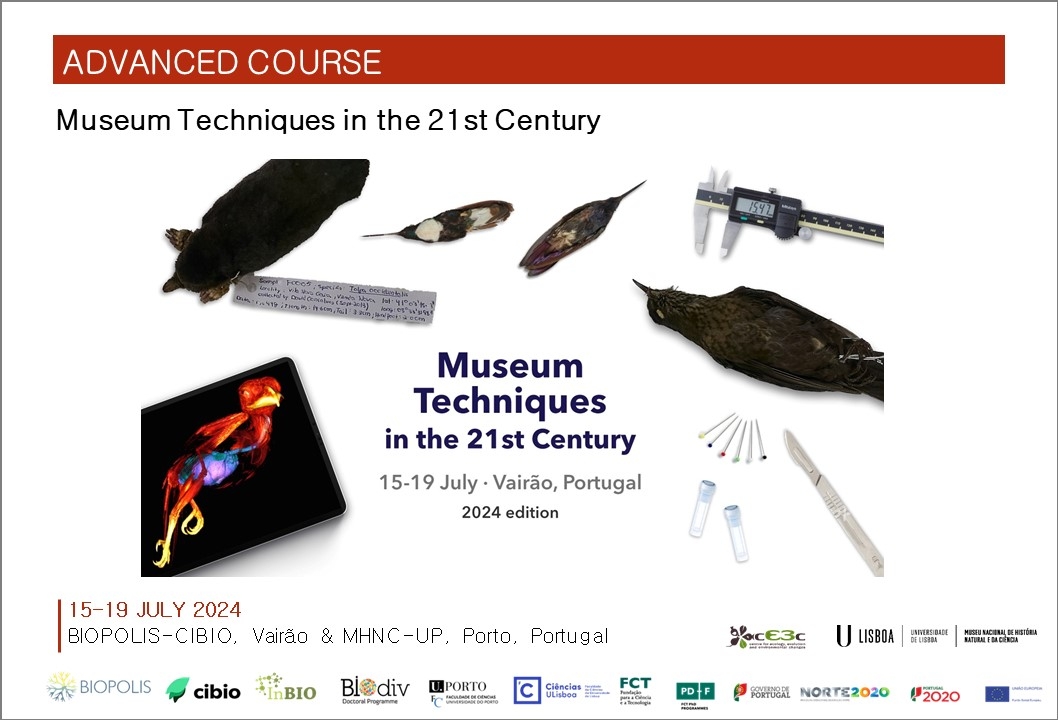Museum Techniques in the 21st Century
Event
15 - 19 July 2024
more updated information in the dedicated website:
July 15th, 2024
BIOPOLIS-CIBIO, Vairão, Portugal & MHNC-UP, Porto, Portugal (Face-to-face)

15 - 19 July 2024
more updated information in the dedicated website:
Welcome to the 6th edition of an intensive course on innovative uses of museum’s resources for vertebrate’s research. By the end of this course students will have an updated overview of the potential of museum collections for biodiversity research. The host instructors, from cE3c-FCUL, CIBIO-InBIO and the Museum of Natural History and Science of the University of Porto (MHNC-UP) and invited instructors from the National Museum of Natural History and Science of the University of Lisbon (MUHNAC) and from Cornell University Museum of Vertebrates (CUMV), will share their knowledge and experience on preparing, curating, and using museum specimens. This will be complemented by presential/online lectures of several invited researchers. In addition, students will practice on several techniques, from 3D photogrammetry to reflectance spectrophotometry. They will learn how to prepare bird and mammal specimens and how tissues can be obtained and preserved for a variety of uses, including genomics, toxicology and chemical analysis.
More specifically we aim to:
1)present an updated overview on the value of museums and the use of collections and specimens in the 21st century, using new technologies and analytical methods, following the principle of the "extended specimen”. These include, among others:
a)discuss state-of-the-art ‘whole specimen’ techniques including CT scanning, 3D modelling and printing;
b)consider how museum specimens provide genetic and genomic resources and how to retrieve genomic data from historical specimens;
c)present other non-genetic molecular methods (e.g., stable isotopes, toxicology and quantification of coloration);
d)understand the potential of the spatial and temporal data gathered along with the specimen, especially when made available in global repositories, such as GBIF.
2)practice the ways that ‘voucher specimens’ and tissues of vertebrates can be prepared, to ensure that quality data is available for generations to come.
PROGRAM
Day 01 | July 15, 2024
| 9:00-10:15
Value of museums in the 21st century - the use of Biological Collections and the principle of the "extended specimen”.
| 10:30-12:45
Invited lectures - "whole specimen” examples, including CT scanning and 3D models
| 14:15-17:30
| 14:15-17:30
Practical session - Current methods for preparing specimens, digital vouchers, photogrammetry and 3D printing
Day 02 | July 16, 2024
| 9:00-10:15
Museum specimens as a genetic and genomic resources - consider how museum specimens provide genetic and genomic resources and how to retrieve genomic data from historical specimens
| 10:30-12:45
Invited lectures - examples on the use of genetic data from museum specimens
| 14:15-17:30
| 14:15-17:30
Practical session - preparing voucher specimens (birds)
Practical session - retrieving genetic material from museum specimens
Day 03 | July 17, 2024
| 9:00-10:15
Museum specimens as a resource for non-genetic molecular analysis - present other non-genetic molecular methods, such as stable isotopes, toxicology, and quantification of coloration
| 10:30-12:45
Invited lectures - examples on the use of non-genetic molecular analysis data from museum specimens.
| 14:15-17:30
| 14:15-17:30
Practical session - preparing voucher specimens (mammals).
Practical session - retrieving coloration data using reflectance spectrophotometry and UV photography.
Day 04 | July 18, 2024
| 9:00-10:15
Museum specimen’s data as a resource for biodiversity analysis - understand the potential of the spatial and temporal data, available in global repositories, such as GBIF
| 10:30-12:45
Invited lectures - examples on the use of museum data for biodiversity analysis
| 14:15-17:30
| 14:15-17:30
Visit to MHNUP collections - types of specimens and storage in a scientific collection.
Practical session - data validation for public repositories (e.g. GBIF) and data retrieval.
Day 05 | July 19, 2024
| 9:00-10:15
Visit to Professional taxidermist office - preparation of specimens for exhibition
| 10:30-12:45
Practical session - preparing voucher specimens (birds & mammals)
| 14:15-17:30
| 14:15-17:30
Practical session - preparing voucher specimens (birds & mammals)
Invited Seminar & Concluding remarks
COURSE INSTRUCTORS
Ricardo Jorge Lopes | FCUL & CE3C & MHNC-UP (Portugal)
Paulo Célio Alves | FCUP & BIOPOLIS/CIBIO
Pedro Andrade | National Museum of Natural History and Science of the University of Lisbon (MUHNAC)
Paulo Célio Alves | FCUP & BIOPOLIS/CIBIO
Pedro Andrade | National Museum of Natural History and Science of the University of Lisbon (MUHNAC)
Mary Margaret Ferraro | Cornell University Museum of Vertebrates (CUMV)
Ana Leitão | BIOPOLIS/CIBIO
SELECTION CRITERIA
The course will be open to a maximum number of 15 participants.
Priority will be given to:
1) 1st year and other PhD students attending the BIODIV Doctoral Program;
2) PhD students attending other courses;
3) Other post-graduate students;
4) Researchers.
REGISTRATION
Registration Deadline: Monday, July 01, 2024
All applicants will be notified about whether they are accepted until Friday, July 05, 2024
95€ (students) | 200€ (other participants). BIOPOLIS-CIBIO members will have an additional discount of 20%.
Participation is free of charge for BIODIV Students MBGE 1st year Students & CIBIO's TwinLabs
Registration fees do not include accommodation, meals and transportation to the Museum
No ECTS credits are awarded for attending the course. Participants receive a certificate of attendance without quantitative evaluation.
